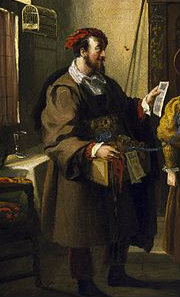|
Home
|
Jan 25, 2016
This week’s themeWords from mythology This week’s words autolycan herculean titan siren song bacchant 
Shakespearean Autolycus selling his wares (detail)
Art: John Cawse (1779-1862)
A.Word.A.Day
with Anu GargThe word myth is from Greek mythos, meaning a story, legend, myth, etc. Mythologies are full of stories with an incredible cast of characters and plots. After all, when the only limit is imagination, why let yourself be restrained by the laws of physics? This week we’ll see five characters from Roman and Greek mythologies who became words in the English language. We start with a word coined after a character from Greek mythology who had the gift of invisibilia: Autolycus. If he had a sister, his parents Hermes and Chione would have named her Hermione.* Well, enough with the sis fuss. On to this week’s words. *Maybe not. That name was already taken by Menelaus and Helen for their daughter. autolycan
PRONUNCIATION:
MEANING:
adjective: Characterized by thievery or trickery.
ETYMOLOGY:
From Autolycus, the son of Hermes and Chione in Greek mythology, who
was skilled in theft and trickery. He was able to make himself (or things
he touched) invisible, which greatly helped him in his trade. Shakespeare
named a con artist after Autolycus in A Winter’s Tale. Earliest documented
use: 1890.
USAGE:
“In a disarming note at the beginning of the book, Adams offers an
apology for his autolycan procedures.” Times Literary Supplement; Jun 5, 1981. “His art was Autolycan, snapping-up, catching the mean minnows of the commonplace when they were off their guard.” Anthony Burgess; Tremor of Intent; W.W. Norton; 1966. A THOUGHT FOR TODAY:
Like all weak men he laid an exaggerated stress on not changing one's mind. -William Somerset Maugham, writer (25 Jan 1874-1965)
|
|
Subscriber Services
Awards | Stats | Links | Privacy Policy
Contribute | Advertise
Awards | Stats | Links | Privacy Policy
Contribute | Advertise
© 1994-2026 Wordsmith